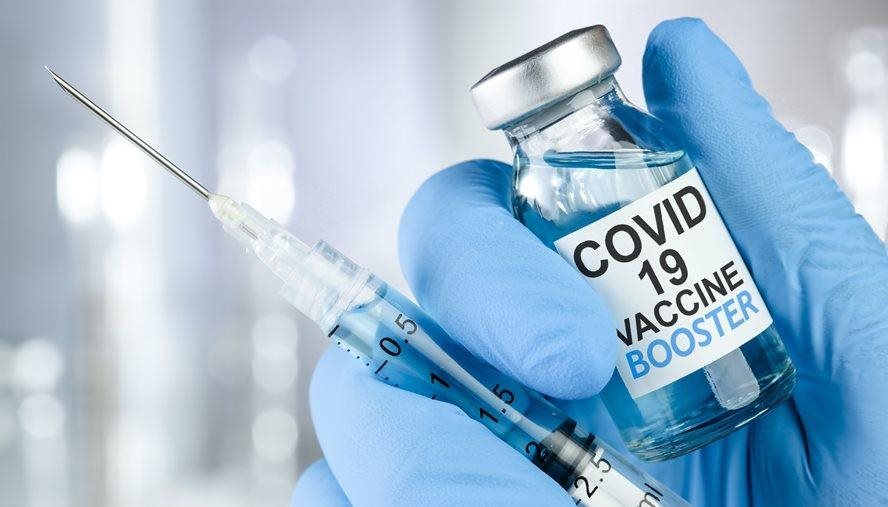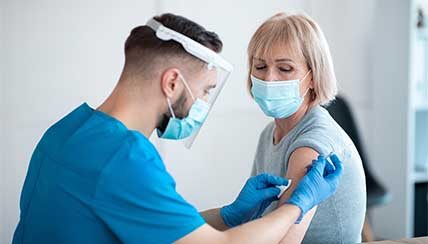COVID-19 (Coronavirus) & Diabetes
 Living with diabetes has its challenges and the COVID-19 pandemic can cause worry and stress. It’s important to note that having diabetes does not increase your risk of contracting coronavirus. However, having diabetes can make it more difficult to fight off infections like the viral infection caused by COVID-19, particularly if your diabetes is not well controlled.
Living with diabetes has its challenges and the COVID-19 pandemic can cause worry and stress. It’s important to note that having diabetes does not increase your risk of contracting coronavirus. However, having diabetes can make it more difficult to fight off infections like the viral infection caused by COVID-19, particularly if your diabetes is not well controlled.
Minimize Risk
Minimize your risk of contracting coronavirus by following the Centers for Disease Control (CDC) guidelines:
- Get your COVID-19 vaccination and boosters
- Wear a mask when near others
- Wash your hands for at least 20 seconds regularly and before preparing food, eating, drinking, or touching your face
- Stay home if you feel ill and avoid those who are ill
- Follow recommendations from the CDC
Keeping your blood sugar levels in range is important, as high blood sugar suppresses your immune system. Check your blood sugar levels frequently to monitor for any substantial lows or highs. Have glucose tablets on hand to take in case of hypoglycemia (low blood sugar).
Prioritize physical activity and healthy eating in order to get or keep your diabetes under good control. This can help you recover from any illness, including COVID-19, more quickly.
Be sure to stock up on supplies for managing your diabetes, including:
- Insulin or other diabetes medications
- Blood sugar testing supplies
- Alcohol wipes
- Other essential medical supplies
Having extra medications that you take regularly on hand also is important. If a State of Emergency is declared where you live, you may be able to refill prescriptions early. It’s better to be prepared than to be caught without critical diabetes supplies and medications if you are quarantined or catch COVID-19.
Be Prepared and Watch for Symptoms
As someone with diabetes, it is important that you have a plan to follow if symptoms of coronavirus develop. Pack a “to-go bag” of diabetic supplies and medications in case you need to go to the hospital and have a list of phone numbers for the providers involved in your medical care.
Blood sugar levels may vary if you decrease your carbohydrate or fluid intake when you feel sick. Monitor your blood sugar levels more frequently than usual during an illness to manage fluctuating blood sugar levels. Be aware that over the counter (OTC) medications can have an effect on your blood sugar. Many OTC cough syrups contain sugar, and while there are syrups that do not contain sugar, these medications can cause your blood sugar levels to rise.
Other medications can be used to treat the symptoms of COVID-19, but should be used with caution if you are diabetic.
- Decongestants can raise blood sugar levels.
- Aspirin taken in large doses can cause blood sugar levels to drop.
- Acetaminophen can cause false or no readings in continuous glucose monitors.
- Ibuprofen can alter the hypoglycemic effect of insulin.
Consult your provider before taking any medication.
Diabetic Ketoacidosis
A condition called diabetic ketoacidosis (DKA) is rare but can occur when people with diabetes have infections, including viral infections like COVID-19. This condition can make it challenging to regulate fluid consumption and electrolyte levels and requires hospitalization. Symptoms of DKA include high blood sugars (typically above 300), excessive thirst, frequent urination, abdominal pain, vomiting, rapid breathing, or confusion. If you develop these symptoms, please seek emergency care.
This information has been reviewed and approved by Jenna Milliron, FNP (February 2022).
The information on our website is medically reviewed and accurate at the time of publication. Due to the changing nature of the COVID-19 pandemic, information may have since changed. CDC.gov and your state’s health department may offer additional guidance. |


